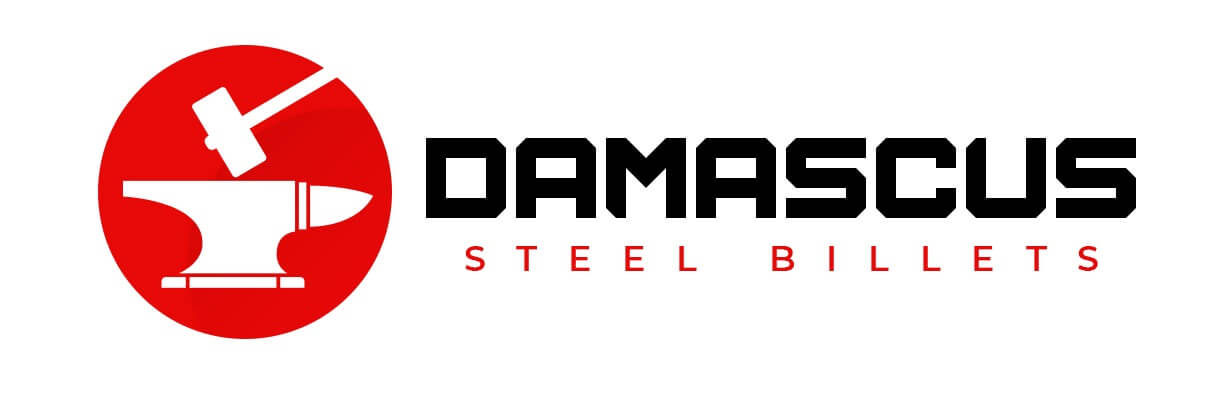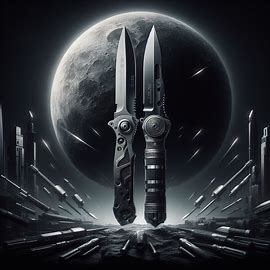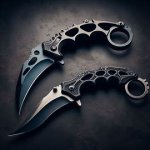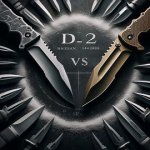There is a dizzying array of alternatives when it comes to knife steel. Two well-liked options, 14C28N, and D2, stand out from the crowd of alternatives. Both have great things going for them, but which one is better? To assist you in making a well-informed selection, this detailed guide will compare and contrast D2 vs. 14C28N steel, going into detail about their characteristics, advantages, and disadvantages.

D2 vs. 14C28N
A Basic Overview of D2 Steel:
The chemical makeup of D2 steel makes it a high-chromium, high-carbon tool steel with legendary edge retention and wear resistance. It usually has chromium(12%), molybdenum(1.5%), vanadium(0.5%), and other alloying elements.
The properties of D2 steel make it a great choice for applications that need cutting performance that lasts a long time and resistance to deformation. It is also robust and has stable dimensions.
Because of its exceptional wear resistance, industrial cutting tools, punches, dies, and knives are made from D2 steel.
14C28N Steel Exploration:
Sandvik’s stainless steel 14C28N is famously robust, corrosion-resistant, and easy to sharpen. It has a carbon content of about 0.62% and a chromium content of around 14%; it also has extra nitrogen for better corrosion resistance.
This steel is ideal for kitchen knives, pocket knives, and outdoor tools because of its outstanding corrosion resistance, simplicity of maintenance, and great edge stability.
14C28N steel’s ideal combination of edge retention and corrosion resistance makes it a popular material for various cutting tools, including kitchen knives, EDC blades, and military knives.
Battle Comparison of D2 vs. 14C28N
| Feature | D2 Steel | 14C28N Steel |
| Carbon Content | High | Moderate |
| Chromium Content | High | Moderately High |
| Molybdenum Content | Present | Absent |
| Vanadium Content | Present | Absent |
| Tungsten Content | Present | Absent |
| Nitrogen Content | Absent | Present |
| Silicon Content | Present | Present |
| Phosphorus Content | Present | Present |
| Sulfur Content | Present | Present |
| Edge Retention | Exceptional | Excellent |
| Toughness | Good | Very Good |
| Corrosion Resistance | Moderate | Excellent |
| Wear Resistance | Exceptional | Good |
| Sharpening Ease | Moderate | Easy |
| Hardness | High | High |
| Price | Typically higher | Moderate |
| Blade Maintenance | Requires more attention | Low maintenance |
| Applications | Industrial tools, knives | Kitchen knives, EDC knives, outdoor tools |
| Rust Resistance | Moderate | Excellent |
| Heat Treatment | More complex | Less complex |
| Grain Structure | Fine | Fine |
| Brittle vs. Ductile | More brittle | More ductile |
| Impact Resistance | Moderate | Good |
| Edge Stability | Excellent | Very good |
| Machinability | More difficult | Easier |
| Precision Cutting | Excellent | Good |
| Availability | Widely available | Available |
| Long-Term Edge Retention | Excellent | Good |
| Ease of Customization | Moderate | Easy |
| Precision Grinding | Challenging | Easier |
| Maintenance Frequency | More frequent | Less frequent |
| Oxidation Resistance | Moderate | Excellent |
| Edge Rolling | Less prone | More prone |
| Edge Chipping | Less prone | More prone |
| Edge Blunting | Slower | Faster |
| Wear Resistance | High | Moderate |
| Edge Stability | Excellent | Very good |
| Blade Flexibility | Less flexible | More flexible |
| Blade Elasticity | Lower | Higher |
| Blade Rigidity | Higher | Lower |
| Machinability | More difficult | Easier |
| Surface Finish | Typically rougher | Smoother |
| Resharpening Frequency | Less frequent | More frequent |
| Blade Material Density | Higher | Lower |
| Manufacturing Cost | Higher | Lower |
| Forgeability | More challenging | Easier |
| Weldability | More difficult | Easier |
| Edge Stability | Excellent | Very good |
Frequently Asked Questions (FAQs):
Which steel is better for outdoor knives, D2 or 14C28N?
The outstanding edge retention of D2 steel makes it the material of choice for outdoor knives that are used often and exposed to tough environments.
Can I sharpen D2 and 14C28N steel using the same tools?
You can use standard ways to sharpen any steel; however, D2 steel, being harder, could take more work.
Is one steel more prone to rusting than the other?
While 14C28N steel has exceptional corrosion resistance, D2 steel is much more prone to it.
In terms of kitchen knives, which steel is more easy to maintain?
Kitchen knives made of 14C28N steel are preferable since they don’t rust and are easy to sharpen. They also don’t need as much maintenance.
Ending The Discussion
To sum up, regarding knife steel, your requirements, and tastes will determine whether D2 or 14C28N is better. D2 steel is the way to go if you’re looking for a material that will retain its edge and last through tough jobs. Nevertheless, 14C28N steel is an excellent choice for knives used for daily tasks or culinary utensils that must be resistant to corrosion and simple to maintain. Thanks to this information, you may now choose the ideal steel with certainty for your future blade.






